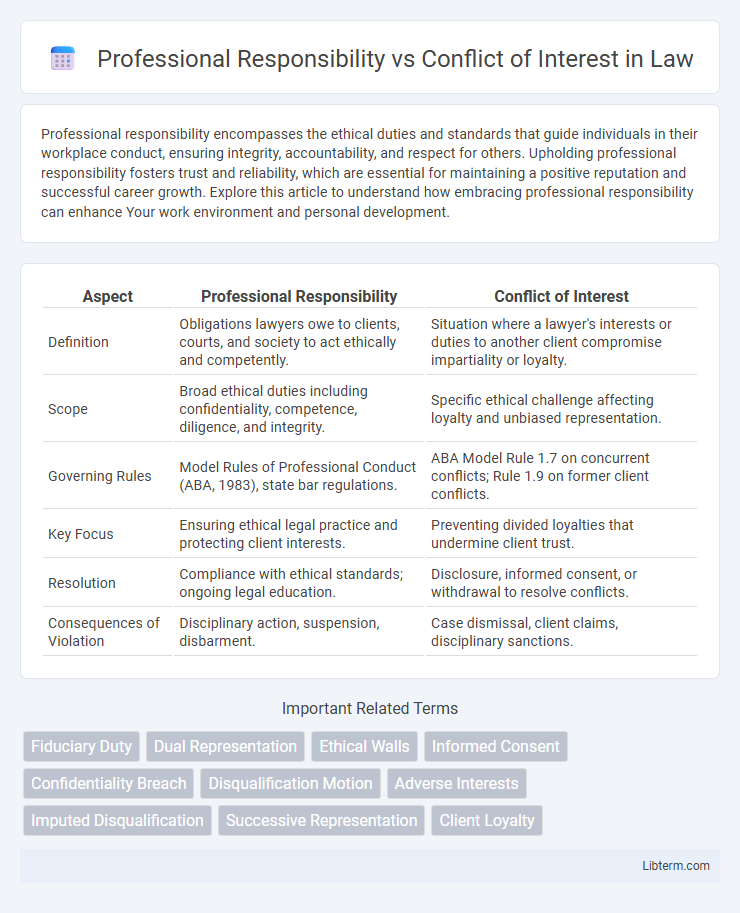Professional responsibility encompasses the ethical duties and standards that guide individuals in their workplace conduct, ensuring integrity, accountability, and respect for others. Upholding professional responsibility fosters trust and reliability, which are essential for maintaining a positive reputation and successful career growth. Explore this article to understand how embracing professional responsibility can enhance Your work environment and personal development.
Table of Comparison
| Aspect | Professional Responsibility | Conflict of Interest |
|---|---|---|
| Definition | Obligations lawyers owe to clients, courts, and society to act ethically and competently. | Situation where a lawyer's interests or duties to another client compromise impartiality or loyalty. |
| Scope | Broad ethical duties including confidentiality, competence, diligence, and integrity. | Specific ethical challenge affecting loyalty and unbiased representation. |
| Governing Rules | Model Rules of Professional Conduct (ABA, 1983), state bar regulations. | ABA Model Rule 1.7 on concurrent conflicts; Rule 1.9 on former client conflicts. |
| Key Focus | Ensuring ethical legal practice and protecting client interests. | Preventing divided loyalties that undermine client trust. |
| Resolution | Compliance with ethical standards; ongoing legal education. | Disclosure, informed consent, or withdrawal to resolve conflicts. |
| Consequences of Violation | Disciplinary action, suspension, disbarment. | Case dismissal, client claims, disciplinary sanctions. |
Understanding Professional Responsibility
Understanding professional responsibility involves recognizing and upholding ethical duties that govern conduct within a profession, including honesty, integrity, and accountability. It requires adherence to established standards that promote trust, confidentiality, and impartiality in professional relationships. Effective management of conflicts of interest is a key aspect of maintaining professional responsibility to prevent bias and ensure objective decision-making.
Defining Conflict of Interest
Conflict of interest arises when a professional's personal interests potentially interfere with their ability to act impartially and in the best interest of their client or employer. This situation undermines trust and compromises ethical obligations by creating divided loyalties between competing responsibilities. Identifying and disclosing conflicts of interest is essential to maintaining professional responsibility and upholding integrity within legal, medical, and corporate practices.
Key Differences Between Professional Responsibility and Conflict of Interest
Professional responsibility refers to the ethical duties and standards that guide an individual's conduct within their profession, ensuring integrity, competence, and accountability. Conflict of interest arises when personal interests potentially interfere with the impartial performance of professional duties, risking bias or unethical decisions. The key difference lies in professional responsibility encompassing the overall ethical framework, while conflict of interest specifically addresses situations where competing interests may compromise professional judgment.
Legal and Ethical Foundations
Professional responsibility in legal practice mandates that attorneys uphold duties of loyalty, confidentiality, and competence to their clients, grounded in ethical codes such as the American Bar Association's Model Rules of Professional Conduct. Conflicts of interest arise when an attorney's ability to represent a client is materially limited by competing loyalties or personal interests, requiring rigorous disclosure and, in some cases, withdrawal to maintain ethical integrity. The legal and ethical foundations emphasize protecting client interests and preserving public trust in the legal system through strict adherence to conflict identification and management protocols.
Recognizing Potential Conflicts in Practice
Recognizing potential conflicts of interest in professional practice requires thorough assessment of relationships, financial interests, and personal connections that may compromise objectivity or duty. Professionals must implement clear guidelines and conduct regular reviews to identify situations where personal or external interests conflict with client or organizational responsibilities. Early detection of these conflicts ensures adherence to ethical standards and preserves trust in professional integrity.
Case Studies: Professional Responsibility Breaches
Case studies of professional responsibility breaches highlight critical conflicts of interest where legal professionals prioritized personal gain over client interests, violating ethical standards. One landmark case involved undisclosed financial stakes influencing counsel's advice, resulting in disciplinary action and reputational damage. These examples underscore the necessity for transparency and strict adherence to professional codes to maintain client trust and uphold the integrity of legal practice.
Consequences of Ignoring Conflict of Interest
Ignoring conflicts of interest can lead to severe consequences such as legal penalties, loss of professional licenses, and irreparable damage to reputation. Ethical breaches often result in diminished trust from clients and stakeholders, undermining an individual's or organization's credibility. Financial losses and costly litigation are common outcomes when conflicts of interest remain unaddressed in professional settings.
Strategies for Managing and Disclosing Conflicts
Effective strategies for managing and disclosing conflicts of interest in professional responsibility include implementing comprehensive conflict-check systems and maintaining transparent communication with clients and stakeholders. Regular training on ethical standards helps professionals identify potential conflicts early, ensuring timely disclosure and avoidance of compromised judgment. Formal policies requiring detailed documentation and third-party review further reinforce integrity and trust in professional practices.
Role of Professional Codes of Conduct
Professional codes of conduct establish clear guidelines to manage conflicts of interest by defining ethical responsibilities and setting boundaries for acceptable behavior in various industries. These codes ensure transparency, promote accountability, and help professionals navigate situations where personal interests may conflict with their duty to clients or employers. Adherence to these standards protects the integrity of professional practice and maintains public trust.
Best Practices for Upholding Ethical Integrity
Maintaining ethical integrity requires strict adherence to professional responsibility standards that prevent conflicts of interest from compromising judgment or client trust. Best practices include transparent disclosure of potential conflicts, recusal from decisions where impartiality is at risk, and continuous education on evolving ethical guidelines within the profession. Implementing robust conflict-check systems and fostering a culture of accountability ensures that actions align consistently with both legal requirements and moral obligations.
Professional Responsibility Infographic

 libterm.com
libterm.com